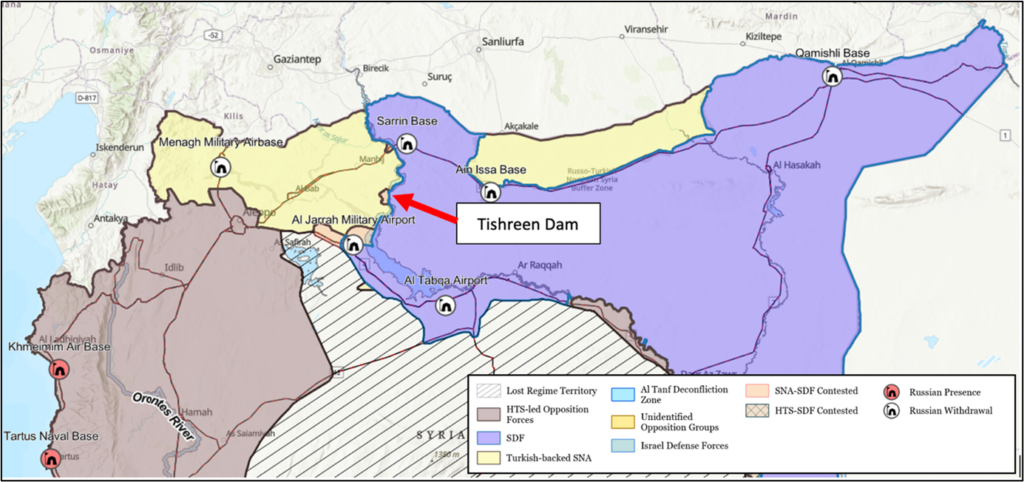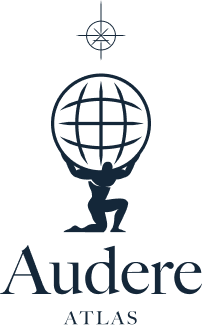
Share
From Ruins to Risk: A Fragile Peace
Welcome to the Audere Atlas, the Audere Group’s fortnightly update on global geopolitical trends, how we engage with them, and what they mean for your organisation.
This week, we discuss the challenges facing the new Islamist-led government in Syria as disputes with the majority Kurdish Syrian Democratic Forces (SDF) in the north threaten to derail the country’s transition and push the country back into conflict.
The Audere Atlas offers timely, actionable insights that both support key decision-making and highlight areas for further exploration and understanding.
The Bottom Line
Post-Assad Syria faces immense challenges, from economic devastation to fractured governance and lingering sectarian divisions. While the new government seeks to attract foreign investment and aid through free market reforms and promises of pluralistic governance, stability, unity, and international cooperation remain critical for recovery and long-term business opportunities.
The Brief
More than two months after a rebel offensive led by Hayat Tahrir al-Sham (HTS) toppled the Assad regime, the dust has settled on the scale of the new government’s challenges. HTS, with extremist Islamist roots, now leads a loose coalition of opposition forces with broad societal backing. The group’s political leadership remains shaky, depriving it of a monopoly on the use of violence: it controls Damascus, its erstwhile base in Idlib, and former regime heartlands on the Mediterranean coasts, but smaller rebel groups maintain de facto control elsewhere. The Turkish-backed militias under the Syrian National Army (SNA)remain powerful in the northwest, while local militias and their commanders retain influence in the south. Both are loyal to HTS in name and have representatives in the capital, but neither has fully integrated their forces with the government; The Kurdish-led Syrian Democratic Forces (SDF), backed by the United States (US), have no such representation and continue to push for autonomy.
HTS has announced its intention to transition Syria toward inclusive governance. Under the leadership of Ahmad al-Sharaa, formerly known by the nom de guerre ‘Mohammed al-Jolani,’ HTS has called for a national conference to draft a new constitution, integrate political factions, and charta pluralistic future. However, decades of economic mismanagement, war, and corruption have left Syria’s infrastructure devastated, its economy crippled, and trust among its communities deeply eroded.


Map 1: Territorial Control in Syria as of 31January 2025 (source/ISW)
Syria is utterly devastated, lacking human and financial capital, and bereft of economic and natural resources. The Syrian pound has lost 99% of its value since 2011, and the Central Bank has been left with reserves barely sufficient to pay for a month of imports, let alone reconstruction costs, estimated at $250-400 billion in 2019. Anaemic industries and $30 billion indebt to Assad’s former backers in Tehran and Moscow add to the strain, meaning the new government will have to rely on foreign aid to cover the bloated public sector wage bill it has inherited. Ahmad al-Sharaa’s pledges to restore electricity, rebuild infrastructure, and create jobs are crucial to maintaining public trust, but achieving these goals will undoubtedly require external support.
Disunity further complicates recovery. The Kurdish-led SDF control much of northeastern Syria but faces hostility from Türkiye and the Turkish-backed SNA. Ankara views the SDF as an extension of the Kurdistan Workers’ Party (PKK) and has conducted drone strikes targeting key frontline areas such as the strategic Tishreen Dam, a vital source of water and electricity and the gateway to the contested city of Manjib, where fierce ground fighting between the SNA and SDF continues. HTS insists on unifying Syria under a centralised government and absorbing Kurdish units into its forces. But integrating the SDF into the Syrian Army remains contentious, with the Kurds demanding autonomy and representation in a future decentralised Syria. Under the threat of a Turkish military operation to disband the SDF, the latter has proposed integrating their units as a separate bloc within a united Syrian army, but HTS has refused. Without resolving these divisions, territorial and political unity will remain elusive.
A lack of agreement could encourage an ISIS resurgence. The SDF currently controls ISIS internment camps housing thousands of fighters and tens of thousands of their family members. HTS has said it is willing and able to take over the running of these camps, but this will depend on a wider settlement with the SDF. It will also depend on the future of US policy towards Syria. Trump’s freezing of US foreign aid budgets in late January temporarily halted the salaries of the camp guards. Both HTS and the SDF will struggle to cover the cost of running the camp in the event of a more permanent US withdrawal of funding. An ISIS resurgence would not only exacerbate Syria’s current instability but would pose acute security challenges for the region.


Map 2: Northern Syria, Southern Türkiye &Tishreen Dam (source/ISW)
International sanctions exacerbate the new government’s problems. The US’s Caesar Act sanctions, alongside other measures targeting the former regime, have designated 700 individuals and firms, crippling vital industries like energy and telecommunications. While the US has signalled a willingness to revoke HTS’s terrorist designation, the sanctions are likely to stay in the short term, hoping to hold HTS to its promise of inclusive government. Relianton aid and diaspora remittances, attracting external investment is an urgent priority. The new government’s broad diplomatic outreach to European, US, Gulfand Turkish leaders shows it recognises this, but success will depend on stability. Renewed authoritarianism and fragmentation remain poised to spoil Syria’s recovery.
So What?
Strategically located with a long Mediterranean coastline, Syria is a key node for projects linking Europe, the Middle East, and Asia. Reviving the Qatar-Türkiye Natural Gas Pipeline, first proposed in 2009 and which would traverse Syria to connect Qatari gas to European markets, could transform regional energy dynamics. Similarly, Syria’s integration into projects connecting the gas fields of the Eastern Mediterranean to Türkiye and Europe could position it as a crucial energy transit hub, helping to diversify Europe’s energy sources amid the geopolitical pivot away from Russian gas. For its part, the European Union could play a transformative role by providing reconstruction funding tied to governance reforms and unlock Syria as a strategic partner.


Map 3: Gas Infrastructure in the Eastern Mediterranean (source/IISS)
Syria’s economic recovery likewise presents long-term investment opportunities. The new government plans to embrace free-market reforms, abandoning Assad-era socialism to attract foreign investment. Its strategy, articulated at the World Economic Forum in Davos by foreign minister Asaadal-Shaibani, focuses on privatising state-owned ports, oil facilities, and factories, and planning public-private partnerships for airports, railways, and roads. Gulf Cooperation Council (GCC) countries, particularly the UAE and Saudi Arabia, have expressed interest in reconstruction, with Turkish firms already expanding their footprint. Shares in Türkiye’s Limak Cement surged by 17%following Assad’s fall, highlighting investor confidence that Turkish companies will play a key role, while Turkish Airlines became the first international carrier to return to Damascus.
European and Gulf donors will not commit significant resources until Syria shows demonstrable signs that political and territorial unity is achievable, and progress toward pluralistic governance is made. Resolving disputes with the SDF and addressing Türkiye’s security concerns meanwhile are critical to keeping Ankaraon the side of the new government. Lifting targeted sanctions on key sectors would empower Syria’s private sector, which sustained livelihoods during the conflict.
Regional businesses will seek to fill the vacuum in Syria, but Syria’s economic opening under stable conditions also presents lucrative opportunities for Western businesses. Construction, energy, and telecommunications companies are well-positioned to benefit, as are energy companies returning to lost or dormant oil fields or seeking exploration contracts for offshore gas. Regional power rivalries—Israel’s efforts to prevent stability, Türkiye’s expansionist aims, and Iran’s bid to restore influence—along with domestic factional tensions risking renewed conflict, require ongoing monitoring.
To thrive, businesses will need a clear market entry plan and resilience strategies to navigate the operational, reputational and compliance risks of operating in-country. Audere’s expertise in complex cross-border investigations and intelligence-led security can support businesses exploring opportunities in Syria.
Keen to know more?
The Audere Group is an intelligence and risk advisory firm offering integrated solutions to companies in complex situations.
We specialise in mitigating the financial, reputational and physical risks faced by our clients in markets across the world through a 360-degree range of services incorporating security advisory, crisis management and strategic intelligence to inform decision making around transactions, supply chains and disputes.
Contact us to learn how our bespoke risk advisory services can work with your unique circumstances to navigate high-risk environments and changing landscapes through the provision of hard-to-reach intelligence and clear analysis.

Disclaimer: The content of this report is for informational purposes only and does not constitute legal or financial advice. For further details or specific inquiries, please reach out to our team directly.





